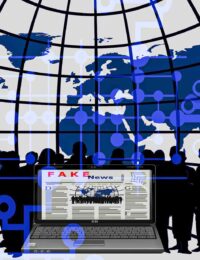Fake news is the deliberate dissemination of false information in a manipulative manner. It includes falsehoods as well as tendentious or deliberately incomplete information published to spread political, religious, social, economic, etc. propaganda.
Fake news also includes the influence of governments or non-governmental organisations to manage political sentiment. Fake news pretends to be accurate, but deliberately spreads misinformation to create sentiment. Similarly, fake online accounts can be used in a targeted and coordinated way to promote discussion and disinformation.
For example, on Sunday 30 October 1938, a broadcast on the American network CBS was interrupted by a news bulletin. The broadcaster announced that there had been an explosion on the planet Mars and that the gas clouds were moving towards the Earth. This was followed by the news that a strange object had been seen in a field in New Jersey. That evening, the young director Orson Welles had staged a radio play based on H.G. Wells’ 1898 novel about an alien invasion, The War of the Worlds.

In an unprecedented form, he entertained radio listeners with various stylistic devices and alleged expert interventions. Some listeners were panicked by the programme, but the mass hysteria reported in the newspapers over the next few days turned out to be a hoax.
Mass manipulation and fake news are therefore not just a phenomenon of our time but can be traced back at least to the advent of popular media. Nowadays, of course, the quantity and accessibility of media and the associated likelihood of fake news have increased many times over.
Media manipulation now refers to the deliberate dissemination of false information on the Internet, especially on social networks.
Political propaganda in the media often aims to manipulate opinions in order to influence media consumers. Destructive feelings and fears of fictitious enemies are also deliberately created to divide and incite people against each other. The more entrenched a political belief, worldview or opinion, the more likely a person will be to believe news that supports that worldview.
The power of the media should not be underestimated in this context. It is in this context that the terms ‘lying press’ or ‘fringe press’ are used.
The big challenge is to recognise dubious internet sources or forums and not to pass on information from such sources without checking it. In particular, articles in Wikipedia and other online encyclopaedias are not immune to misinformation.
There are also one-sided articles from some religious, economic, social or political opinion manipulators. Convenience and a gullible mind are ideal breeding grounds for manipulation. Sharpening your own mind and using it is therefore the best prevention.
Fake news is deliberately controlled disinformation designed to arouse emotions and manipulate the public in a one-sided way. It is very often found in monopoly media.
Biased and manipulative reporting can also be found in the areas of freedom of belief, spirituality/religion, alternative medicine, etc.
Many bloggers or “journalists” cloak themselves in the mantle of science in order to make a living from sensationalising their readers. They do not hesitate to insult other people with different religious values, to damage their reputation, to denigrate them or to make them look ridiculous.
Their research is often unscientific and dishonest, and their sources are often based on “hearsay“. They are officially in favour of “freedom” and the rights of minorities, and their journalistic work makes them the greatest enemies of freedom of expression.
They present themselves as “do-gooders“, while at the same time insulting all people with different values, portraying them as Nazis, extremists, radicals, agitators, racists or homophobes, when they should be in the other categories.
They are like pawns on a chessboard who do not understand the ‘big picture‘ and are themselves being used by various corporations, parties or power groups for their own interests without even realising it.
They are the real mobs who, in the Middle Ages, burned any dissident at the stake “in the name of God“. Today, instead, they stammer the phrase … “in the name of science!” Instead of burning at the stake, they are burning the reputations of those who think differently.





